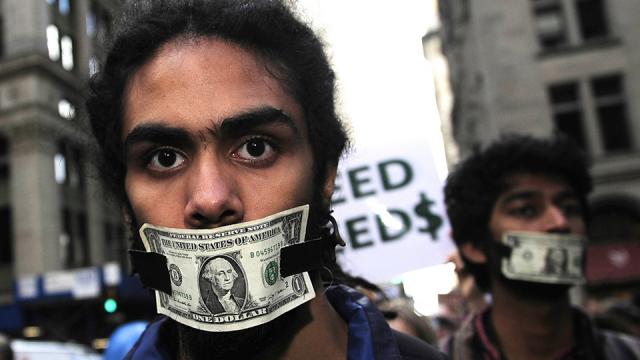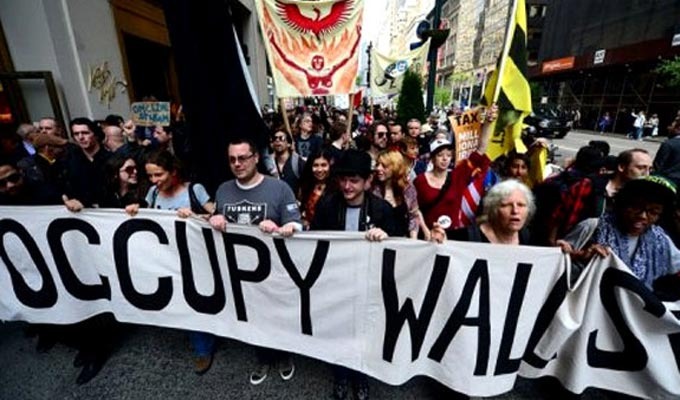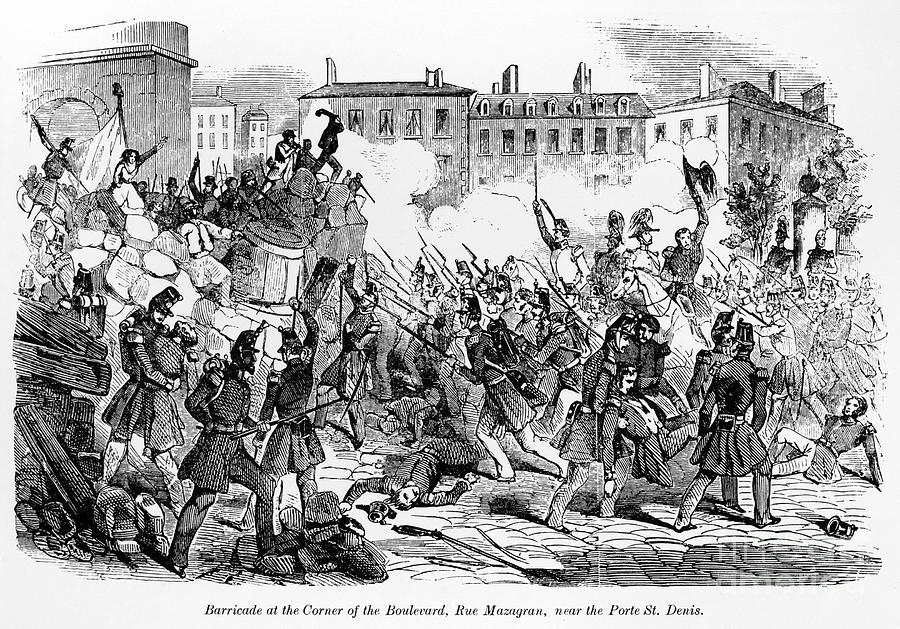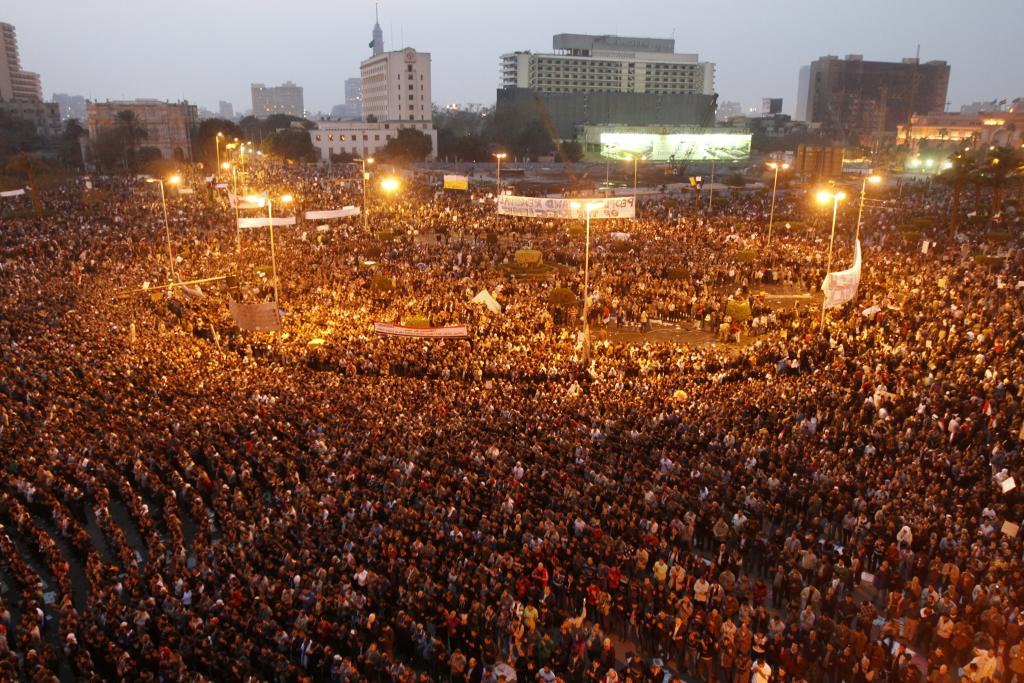
Where have all the chanters gone; the gospel-minded Christians and the denouncers of "banksters" and tyrants; the homeless and the indebted and unemployed who filled our urban squares in 2011-12, crying out such slogans as "We are the 99 percent" and "The people want the end of the regime"? Where are the leaderless revolutionaries who turned cities around the world upside down?
The simple answer is: they were dispersed. When the sometimes public parks were swept clear of troublemakers, many dispersed into a scatter of left-wing campaigns. Other activists now escort visitors around bare, fenced-off Zuccotti Park near Wall Street. In London, free bus tours with guides in top hats carry the curious around the City and Canary Wharf (“Make your very own ‘credit default swap’ and find out how to create money out of thin air!”).
One Occupy London stalwart, a sermon-on-the-mount Christian who negotiated with the Bishop of London at St Paul’s in 2011, emails me to say: “Many of us from Occupy London have ended up going all over the world. Our decisions to travel to the far-reaches were probably inspired by Occupy in many cases, although not all of us are working as activists in other countries. We remain in touch with each other, and support the hardcore group that are fighting fracking in the U.K. now … B returned to the USA, C is in Pakistan, D in Spain, E in Tunisia, F in Greece, others are in India, Africa, Thailand … I am currently living in Kuwait, teaching the young to be critical thinkers.”
After the dispersals, game efforts were made to rally Occupy spirit, not only on streets and in public parks that were being privatized, but also in bookshops and on news stands, in parliaments and city halls. It’s a cliche, a true one, that the Occupy movements changed the conversation. Reform mayors like New York City’s Bill De Blasio (theme: "a tale of two cities") were elected.
On talk shows, best-seller lists and the business sections of newspapers – even, yes, in university economics departments – inequality is all the rage. At the time of writing, Thomas Piketty’s "Capital in the Twenty-First Century" ranks #4 among all books on U.S. Amazon, and #15 in Britain. In the U.S., this subversive little theme has infiltrated the rhetoric of the Democratic Party and even right-wing populists among the Republicans, including the libertarian David Brat, who up-ended House majority leader Eric Cantor in a Virginia primary on June 10, declaring: “All the investment banks in the New York and [Washington] D.C. – those guys should have gone to jail. Instead of going to jail, they went on Eric’s Rolodex, and they are sending him big cheques.”
Thirty-three months ago, Occupiers easily outnumbered investment bankers, filling public places with mostly young, urban, multiracial, anarchist, libertarian and sometimes reformist folk, mostly in the more prosperous (though reeling) countries. But after weeks or months, city governments, coordinated nationally, dispersed them – irrespective of the formal guarantees of "the right of the people peaceably to assemble, to petition the government for redress of grievances," to quote a little-noted passage in the First Amendment to the American Constitution.
Even more resounding were the political uprisings that either overthrew governments or restored some hope that, against rightward and neoliberal turns throughout the world, popular movements of the left had a future. If 2001 was the Year of the Towers, as Anthony Barnett wrote, 2011 was the Year of the Squares. Now, for the most part, the squares are emptied. In Cairo’s Tahrir and Istanbul’s Taksim, the police still fire tear gas, rough up reporters, and fire water cannon to ‘cleanse’ these scenes of uprising potential, while kept media in Russia, Turkey and Egypt, in the time-honored way of authoritarian regimes, blame outsiders and their alien ‘agendas.’
Squares still fill — namely Kiev’s Maidan and the occasional crowd at Madrid’s Puerta del Sol, where signs recently appeared bearing slogans like "Ni generales ni reyes. ¡Elijimos nuestros jefes!" ("Neither generals nor kings. Let’s elect our leaders!") But overall, the rage is diffuse and the issues are (as almost always they must be) local. Political focus goes fuzzy. The clamor is like tear gas that escapes its container: everywhere but nowhere.
The new movements, as Cambridge sociologist Gören Therborn has pointed out, are city movements, not national ones, yet most of the changes they want, either explicitly or implicitly, require action by nation-states. Implicitly, many of Spain’s indignados recognised this when they supported a new party of ‘decent ordinary citizens’, Podemos, which captured 1.25 million votes in the Euro-parliamentary elections, catapulting it overnight into position as the country’s fourth largest party. Not surprisingly, this disjunction between turf and at least short-term political outcome poses special problems for how to continue and what to accomplish.
What happened to the occupations? Well, what made them mushroom so spectacularly was what also made them collapse once the police stepped in — their dependence on social media. The Turkish-American sociologist Zeynep Tufekci has rightly noted that “these huge mobilizations of citizens inexplicably wither away without the impact on policy you might expect from their scale.” She explains the paradox well: it’s much easier to pull off spectacular events with digital technologies than to knit together lasting organisations. And it’s also easy to mistake the former for the latter.
The problem arises, Tufekci adds, “not because social media isn’t good at what it does but, in a way, because it’s very good at what it does. Digital tools make it much easier to build up movements quickly, and they greatly lower coordination costs. This seems like a good thing at first, but it often results in an unanticipated weakness: before the internet, the tedious work of organising that was required to circumvent censorship or to achieve a satisfactory-sized protest also helped build infrastructure for decision-making and strategies for sustaining momentum. Now movements can rush past that step, often to their own detriment.”
Waves of uprisings like those of 2011-12 are rare. In 1848, most of the liberal-nationalist insurgencies of Europe and Latin America were crushed. Many defeated Germans ended up in America, where they supported the anti-slavery cause. Some defeated rebels, like Richard Wagner, veered hard right. Gustave Flaubert withdrew from politics. Britain’s Chartist movement peaked, but most of its programme was subsequently passed. Some of the 2011-12 activists of Tahrir and Gezi have been murdered, jailed, hospitalised, or exiled. Others scramble to find continuations. While appreciating what the movements accomplished, many realise how isolated they were (“Cairo is not Egypt,” as the astute Egyptian blogger Sandmonkey warned in March 2011). No grail to compensate for the isolation of passionate democrats has been found.
Above I mentioned tours of Zuccotti Park. An Occupy activist named Cecily McMillan was one guide there this year, showing the site to relatives and friends who, in early May, had gathered to hear the jury’s verdict after her trial for felonious assault on a police officer during the forcible clearance of the park on March 17, 2012. The officer testified the attack had been unprovoked. According to McMillan’s testimony, he had grabbed and groped her, then hurled her to the ground, bruising her badly and causing her seizures.
Forty-eight hours later, after a trial where the jury was prevented from seeing and hearing much exculpatory evidence, McMillan was on her way to Rikers Island, the city’s decrepit, immense jail complex, awaiting sentence, which turned out to be 90 days (she could have been sent away for up to seven years) despite a letter to the judge from a majority of the jury asking that she not be sent back to jail at all. At Rikers, where she was one of more than 12,000 prisoners, McMillan was denied medication. She was also denied bail, and was released after 58 days. She plans to move back to her hometown of Atlanta – a kinder, gentler city.
What imprint has the Occupy moments and movements left on our cities? Cascades of activism, for one thing. Inspiration wafts through the culture, bubbles of energy and precedents for other struggles and tactics. It’s easiest to see around universities, where campaigns for divestment from fossil fuel corporations are picking up, spurred in part by Occupy "graduates." Campaigns against massive student debt (currently estimated at about $1 trillion in the U.S.) that will saddle graduates for decades have gotten off to a ragged start but probably have a future. While many Occupiers returned to regular, out-of-park life, some unknowable number of these debt-saddled young people – who felt, for a moment, they could get their hands on the levers that move the world – got a whiff of a feeling some of them want to get more of.
In New York City, energy flowed into campaigns against police stop-and-frisk practices and to help victims of 2012’s Hurricane Sandy. Occupy experience put organizers in touch with community members normally scornful of "weirdos" but resolved to fight corporate power. One experienced organizer, fresh from Occupy in Missouri, went on to help launch the Take Back St Louis initiative, subtitled Reclaiming our Tax Dollars for a Sustainable Future. The group gathered more than 22,000 signatures of registered voters, more than enough to put on to an April 2014 ballot a measure to "stop the city from giving tax breaks and other incentives to corporations that mine coal, gas and oil, and any corporation doing $1m of business with a mining company"; to "create a sustainable energy plan in the city that would invest public money in and open up land for renewable energy and sustainability initiatives like weatherization programs, urban farms and solar arrays." In other words, to create sustainable jobs – against the retrograde claim that measures to halt global warming are "job-killers."
There is, it happens, one mining company headquartered in St. Louis, and it’s a giant: Peabody Coal, the world’s largest company that mines the dirtiest fuel. Working together, the mayor and Peabody Coal lawyers convinced a judge to grant an injunction, declaring that coal companies share equal rights with people (citing the recent Citizens United Supreme Court decision), but the coalition is appealing to a higher court. Meanwhile, the cascade rolled on: students at Washington University in St Louis, never before a hotbed of activism, sat-in for more than two weeks at the university president’s office to protest the membership of Peabody’s president on the university’s board of trustees. The anti-corporate spirit rides high among them. Occupy fanned such flames.
As for the executives in corner offices and boardrooms around Wall Street and Canary Wharf, in state houses and Washington, are they relieved that the rabble were swept away? Do they believe that partial financial reforms will insulate them against risings to come? Beyond growing attention to public relations (probably a growth centre for future employment), are they mindful, as they make policy, that those who once awoke to fill the streets and parks may awaken again? Do they suspect, late at night, that youngsters in sleeping bags might turn out to be the modern equivalent of peasants with pitchforks?
Political rationality, if not fear, may well make elites more responsive. Rumblings on the Right are not the only noises emanating from Europe. The sparks that set Occupy on fire fell on inflammable tinder, and this is how history goes: one spark, then another, ignites a whole landscape. The Occupy graduates hope that their time will come again. They might turn out to be wrong – until, one day, they’re right.
3 WAYS TO SHOW YOUR SUPPORT
- Log in to post comments


















